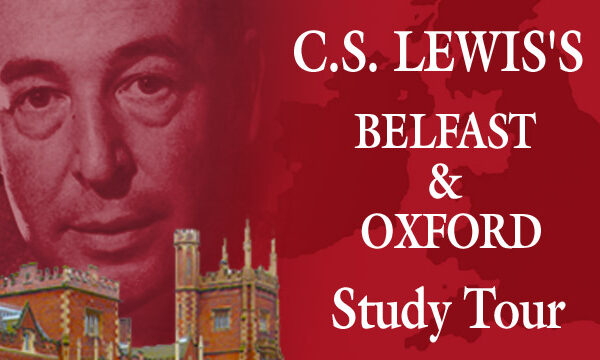Back to series



C.S. Lewis on Faith and Reason
C.S. Lewis said: “I am not asking anyone to accept Christianity if his best reasoning tells him that the weight of evidence is against it.” He develops his case particularly in such books as Mere Christianity, The Abolition of Man, Miracles, and The Problem of Pain. Lewis decidedly gave place to rationality. However, while upholding a place for rationality, he was opposed to the rationalism of the Enlightenment, which gave almost no place to the human imagination or to the idea of belief in a personal God. In other words, he opposed what in our day is called Modernism.
Lewis Against Rationalism
Pilgrim’s Regress was Lewis’s first apologetic book written only two years after he came to faith in Christ. In this book, John, the hero, sets out from Puritania on the quest for a vision. Unlike Pilgrim in John Bunyan’s Pilgrim’s Progress, he does not encounter generic temptations on his path to glory, but intellectual advocates of the modern world similar to what Lewis faced everyday at Oxford. One of the first such characters is Mr. Enlightenment, a proponent of rationalism (Modernism). Remember that Puritania is a place where they believe in the Landlord (God):
‘And where might you come from, my fine lad?’ said Mr. Enlightenment.
‘From Puritania, Sir,’ said John.
‘A good place to leave, eh?’
‘I am so glad you think that,’ said John.
‘I hope I am a man of the world,’ said Mr. Enlightenment. ‘Any young fellow anxious to better himself may depend on finding sympathy and support in me. Puritania! Why, I suppose you have been brought up to believe in the Landlord?’
‘Well, I must admit I sometimes feel rather nervous.’
‘You may make your mind easy, my boy. There is no such person.’
‘There is no Landlord?’
‘There is absolutely no such thing—I might even say no such entity—in existence. There never has been and never will be.’
‘And this is absolutely certain,’ cried John, for a great hope was rising in his heart.
‘Absolutely certain. Look at me, young man. I ask you—do I look as if I was easily taken in…?’
‘But how do you KNOW there is no Landlord?’
‘Christopher Columbus, Galileo, the earth is round, invention of printing…gunpowder!!’ exclaimed Mr. Enlightenment in such a loud voice that the pony shied.
‘I beg your pardon,’ said John.
‘Eh?’ said Mr. Enlightenment.
‘I didn’t quite understand,’ said John.”
When Mr. Enlightenment argues against the truth of many religious stories, John summarizes his argument:
‘I think I see, most of the stories about the Landlord are probably untrue; therefore, the rest are probably untrue.’
‘Well, that is about as near as a beginner can get to it perhaps. But, when you have had scientific training, you will find that you can be quite certain about all sorts of things which now seem to you only probable….’
‘I’m not sure that I have really understood your arguments, Sir. Is it absolutely certain that there is no Landlord?’
‘Absolutely, I give you my word of honor.’
Notice how the rationalist covers the deficiency of argument with dogmatic assertions. You are tempted to say, “Methinks thou dost protest too much.” The atheist is asserting a universal negative statement that there is absolutely no God.
How would you go about proving such an assertion? The interesting fact is that the negative statement is harder to prove than the positive. For instance, how could you prove the statement, “There is no gold in Alaska.”? You would have to determine the borders of Alaska, and how deep Alaska goes, and dig up every square inch of Alaska. If there was one square inch you didn’t dig up, you might find gold there. On the other hand, how could you prove the positive assertion, “There is gold in Alaska.”? You need only find one piece. If there were any gold in Alaska, you would presumably find it sooner than proving that there was none. Similarly, what would you have to know in order to know that “There is no God”? In a word, everything. If there was one thing you didn’t know, that one thing might be God. We are so far from knowing everything that there is to be known that the above dogmatic assertion is not only un-provable but also arrogant.
One time, a friend asked the famous atheist Madalyn Murray O’Hair a question: “How much of that which there is to be known do you claim to know, 10%?” She laughed and said, “O.K. 10%.” He asked, “Is it possible that God might exist and be part of that 90% of reality that you admittedly don’t know?” She paused and was silent for about a minute. Then she said, “A qualified ‘no,’” and quickly moved on to another question.
Often, atheistic arguments depend a lot more on rejecting in a confident manner any belief in God, on name-calling, or on condescending phrases and attitudes to cover their lack of argument. They pretend to be a lot more certain than their arguments warrant. The Postmodernists have strongly and rightly attacked this audacity. There is much about life and reality that is not directly accessible by means of reason. Again, this is not to deny a significant place for rationality, but it is a rejection of rationalism.
Dealing With Doubt
Lewis develops his case for Christ in many places, and parts of that case will be developed in future articles. If Christianity cannot face the toughest questions of our age, it will be the first time in two thousand years. Many believers today are not aware that the most brilliant minds of all history have been believers. Thinkers such as Augustine, Aquinas, Calvin, Edwards, and Lewis have given answers to the classic objections.
However, even after one establishes a strong intellectual framework, this will not necessarily assure the absence of doubt. In fact, most of the doubts we encounter are emotional or spiritual in origin rather than intellectual. C.S. Lewis maintains:
…supposing a man’s reason once decides that the weight of evidence is for it. I can tell that man what
is going to happen to him in the next few weeks. … there will come a moment when he wants a woman,
or wants to tell a lie, or feels very pleased with himself, or sees a chance of making a little money in some
way that is not perfectly fair; some moment at which it would be convenient if Christianity were not true.
And his emotions will carry out a blitz. I am not talking of any moments at which any real reasons against
Christianity turn up. Those have to be faced, and that is a different matter. I am talking about moments
where a mere mood rises up against it.... Now faith in the sense in which I am here using the word is the
art of holding onto the things your reason has once accepted, in spite of your changing moods. For moods
change whatever view your reason takes.
For instance, one young man was having regular doubts about his faith. After a couple meetings, we mutually agreed that I had answered the intellectual questions he had brought to me. However, it was clear to me that this would not end his doubt. He had been deeply hurt by his parents and by various people in his life to the extent that he had a great fear of trusting or committing himself to anyone, including God. The emotional issues must be addressed before a passionate commitment can be sustained.
Although we will not develop the subject much here, there is much doubt of a spiritual origin. We need to put on the helmet of salvation, the belt of truth, the sword of the Spirit, the Word of God, and take up the shield of faith in order to quench the “fiery darts” of the evil one. (Eph 6:10-18) These “fiery darts” often consist of all kinds of doubts, especially about the goodness of God. There are times when we find certain situations to be incomprehensible; we don’t know why these things are happening to us. But, like Job, we can know why we trust in the God who knows why. In other words, there are times in which it may be wise to trust God even though it may seem to us unreasonable. C.S. Lewis argues:
In getting a dog out of a trap, in extracting a thorn from a child’s finger, in teaching a boy to swim or
rescuing one who can’t, in getting a frightened beginner over a nasty place on the mountain, the one
fatal obstacle may be their distrust.... We ask them to believe that what is painful will relieve their pain, and
that which looks dangerous is their only safety. We ask them to accept apparent impossibilities: that moving
the paw farther back into the trap is the way to get it out—that hurting the finger very much more will stop
the finger from hurting, that water which is obviously permeable will resist and support the body… that to
go higher and onto an exposed ledge is the way not to fall.
In other words, in these kinds of circumstances, we can only trust the person who is offering help. I can recall instances with my young sons such as getting out a splinter, touching a loose tooth, or teaching them to swim when I have to convince them that I really want to help them, not hurt them. Once our oldest son Trey had his finger crushed by a rock. I can remember having to talk him through every step of the process: the shot to numb his finger, the several stitches in the top of his finger, and his many questions about what was happening and what it would be like. He got through it, and his finger totally healed in about a month, but I had to draw on all the capital of trust I had accumulated in our relationship. In a similar way, there are certain circumstances when we, like Job, don’t know why we are experiencing pain, but we can only trust God. We can only know that we trust the God who knows why.

Arthur W. Lindsley
Senior Fellow for Apologetics, CSLI Arthur W. Lindsley is the Vice President of Theological Initiatives at the Institute for Faith, Works, & Economics. He has served at the C.S. Lewis Institute since 1987 both as President until 1998 and currently as Senior Fellows for Apologetics. Formerly, he was director of Educational Ministries at the Ligonier Valley Study Center, and Staff Specialist with the Coalition for Christian Outreach. He is the author of C.S. Lewis's Case for Christ, True Truth, Love: The Ultimate Apologetic, and co-author with R.C. Sproul and John Gerstner of Classical Apologetics, and has written numerous articles on theology, apologetics, C.S. Lewis, and the lives and works of many other authors and teachers. Art earned his M.Div. from Pittsburgh Theological Seminary and a Ph.D. in Religious Studies from the University of Pittsburgh. COPYRIGHT: This publication is published by C.S. Lewis Institute; 8001 Braddock Road, Suite 301; Springfield, VA 22151. Portions of the publication may be reproduced for noncommercial, local church or ministry use without prior permission. Electronic copies of the PDF files may be duplicated and transmitted via e-mail for personal and church use. Articles may not be modified without prior written permission of the Institute. For questions, contact the Institute: 703.914.5602 or email us.
COPYRIGHT: This publication is published by C.S. Lewis Institute; 8001 Braddock Road, Suite 301; Springfield, VA 22151. Portions of the publication may be reproduced for noncommercial, local church or ministry use without prior permission. Electronic copies of the PDF files may be duplicated and transmitted via e-mail for personal and church use. Articles may not be modified without prior written permission of the Institute. For questions, contact the Institute: 703.914.5602 or email us.
-
Recent Podcasts
A Welcome Change in Apologetics
by Randy Newman, Aimee Riegert on April 19, 2024We’re burdened for our friends who don’t know...Read More
-
Questions That Matter Podcast – Samuel James and Digital Liturgies
by Samuel James, Randy Newman on April 19, 2024
-
The Side B Stories – Dr. James Tour’s story
by Jana Harmon, James Tour on April 12, 2024
-
Recent Publications
Isn’t Morality Relative?
by Christopher L. Reese on April 1, 2024It is widely accepted in the Western world...Read More
-
Do Muslims and Christians Worship the Same God?
by Andy Bannister on March 1, 2024
-
Artificial Intelligence and Its Impacts on Humanity
by John Lennox on February 13, 2024
0
All Booked
0.00
All Booked
0.00
All Booked
20599
GLOBAL EVENT: 2024 Study Tour of C.S. Lewis’s Belfast & Oxford
https://www.cslewisinstitute.org/?event=global-event-2023-study-tour-of-c-s-lewis-belfast-oxford-2&event_date=2024-06-22®=1
https://www.paypal.com/cgi-bin/webscr
2024-06-22

Next coming event
Days
Hours
Minutes
Seconds
GLOBAL EVENT: 2024 Study Tour of C.S. Lewis’s Belfast & Oxford
On June 22, 2024 at 12:00 pmat Belfast, Northern Ireland & Oxford, EnglandCategories
Speakers

Arthur W. Lindsley
Senior Fellow for Apologetics, CSLI
Team Members





